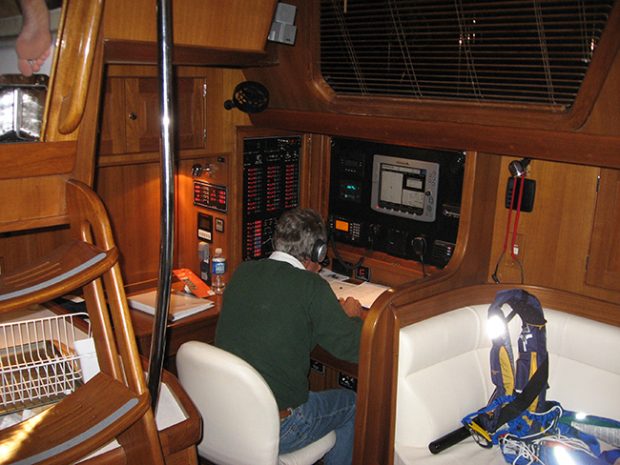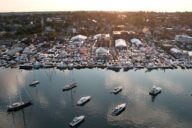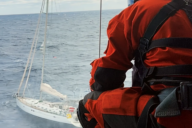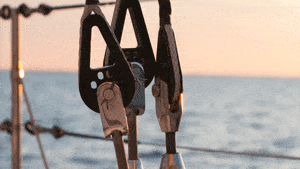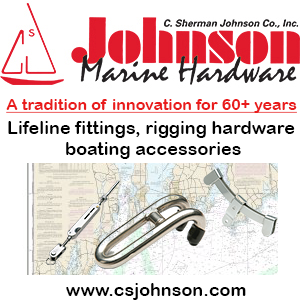In last week’s Cruising Compass newsletter, the Just Cruising column was about “The SSB Debate”. In the past, everyone who went off cruising, had a SSB onboard. Now, with sat phones, Iridium Go and laptops that is not necessarily the case. A number of readers chimed in, here are a few examples:
Hi George,
I just wanted to comment on SSB. I too sailed the Pacific islands in the 70’s with not even a transmitting radio. Just an Oceanic worldwide receiver, and a sextant. We also moved on to a ham radio, and SSB radio in later years on our second Pacific crossing. I loved the nets! The idea of keeping in touch with fellow cruisers across many miles of ocean was comforting. Also the weather guys who warned us of anything coming, safety info and my daughter had a kids net. You do not get that with a Sat phone. I mourn the ending of SSB radio use. But if no one is on the radio to communicate to, what then? I think we are becoming again isolated out in the oceans. Kind of like a circle of life. First no communications for years, then lots of nets and camaraderie in the 80’s and 90’s, then isolation again with just the ability to communicate with one person and electronic weather. I kinda mourn the loss. Don’t you?
Marilyn Cook
Retired professional 150 ton captain, 40 year world cruiser.
Hi George
When my wife Nancy and I purchased our new Hanse 505, “Maverick”, we had a plan to sail across the Atlantic sometime in the future. Therefore when evaluating what extras to put on the boat, an SSB was an obvious traditional option, but after researching the current state of technology we chose to go without an SSB and to install both an Iridium GO and later an Inmarsat Sailor satellite communications system. These systems serve several purposes, only some of which would be handled by an SSB. The systems automatically track location via a dedicated GPS and post our track to a website accessible to family and friends back home. Both provide for instant emergency voice broadcasts, but the Inmarsat company operates the worldwide emergency dispatching system, so at the push of a button the Sailor connects directly to the control room for emergency dispatch, at any time, day or night. The Inmarsat was also reliably available for voice communications or data at any time crossing the Atlantic last summer, through its geostationary satellites. There is no dropped signal and the quality of the voice communications is like speaking on your cell phone. Data is also much faster than SSB and most other satellite systems. Approaching England, we were able to scan in our passports, speak via Sailor to the Border Force and receive an email back with our immigration clearance for 6 months in the UK. This took moments. So my opinion is that if your boat doesn’t already have SSB, you should seriously consider installing satellite systems instead. The one downside is that once you’ve installed the SSB, subsequent communications are free, which is definitely not the case with satellite. So at some point the lines cross.
Steven McInnis s/Maverick
Hi George,
While many feel very secure with a Sat phone aboard, you may be fooling yourself. Yes, it is fairly reliable communication. But it is point-to-point and if the person you are calling doesn’t answer, you need to have a few back-up numbers to call. And then you need to be calling someone who understands life offshore well enough to get your message across as to what you need.
On the other hand, if you put out a call on any one of a large number of frequencies on SSB or HAM radio, you will find you are getting multiple responses to your call for assistance. Without getting into a listing of stations available (a fairly complete listing is available from DocksideRadio.com), I will just say that there are a number of nets operating at various times on SSB, and that there is a presence on HAM frequency 14.300 daily. (In the event of an emergency, non-HAMs may make contact on the Ham BANDS)
The FCC has recognized the value of having Coastal Stations, capable of communicating with vessels offshore. One of the very first such Coastal Station licensees was WCY, your “weather guru” (and ours!), Chris Parker.
We also applied for, and received a Coastal License, KNC, in Dover, NC, for our St. Jude Doodah Nets, and were followed by Glenn Tuttle, KPK in Punta Gorda, who concentrates mostly on the Caribbean. Although not linked together in a business sense, all three of us have a mutual interest in cruisers’ safety and share information in the event of an emergency offshore.
By utilizing the Coastal Stations’ enhanced ability to transmit over long distance, combined with our individual locations and antenna advantages, we have been able to tie vessels in danger with other vessels operating in their immediate area. We had an instance a couple of years ago with a vessel in the South Pacific that was taking on water. We put out a call for anybody in the area to respond, and I think you even wrote up the incident, as a couple of cruisers helped the couple off their sinking boat just as it settled out of sight. Can you imagine how your Sat phone would have worked in this situation?
As a HAM operator (W3RDT) and a SSB Coastal Station (KNC) we have been doing this service for almost 17 years, and 7 days a week for all of that time. We have not pounded our chest that we are here and doing wonderful things; however we are listed with DocksideRadio.com, and I know Chris Parker and Glenn Tuttle are too. It’s not like we are alone in this; Chris, Glenn, and I all have volunteers relaying for us, so that we are able to cover wide areas, and the operators on 14.300 Nets also utilize relays as needed. We don’t charge for our service, and I know that Glenn doesn’t either. Chris is unique, in that he charges for the weather information, but he wouldn’t think of charging a penny for giving assistance to boaters in trouble.
It’s little more involved if you want us to “track” you. You need to supply us with a completed USCG Float Plan so that we have the pertinent information about your boat and the people on board. Still….there is no charge…. such a deal, huh?
Keep up the good work!
Judy & Dick
Hey George,
Yes, you certainly may quote from the letter. The one criticism I hear, over and over, is that the SSB is too complicated to operate. Granted, if you are not “wired” for radio communications, the SSB can be somewhat daunting. Instead of simplifying operating procedures, the manufacturers have made them more complicated. Right now, only ICOM markets a SSB in the US market. It is a great radio, and jumps through a lot of burning hoops, but like your new car, features a lot of gadgets you really don’t need. Marketing rules!
Judy & Dick
Mr. Day,
I very much take exception to anyone mistaking the older technology SSB as somehow less capable or “not as good” as satellite based systems. I would never choose only Satellite based systems. There is elegance to HAM equipment that does not rely on ANY outside third party. When there is a disaster the only communication is very often HAM radio. I particularly am an old school cruiser who believes strongly in self reliance. Paying for a satellite service is in antithesis to this. I have the same issue with modern sailors who would be (literally) lost without their GPS. I would never do passagemaking without a sextant… but I have friends who just have backup GPS units (don’t get me wrong I love my chartplotter and I DO have a backup GPS … but I would be loath to rely on GPS and I make sure I have self reliant backups… like dead reckoning etc.)
I am old school and I admit that… but the reliance on electronics seems somehow elitist to me. There are a lot of cruisers who don’t have the resources and do just fine or even better without. (Our 73 year old winner of the Golden Globe race didn’t understand what all the fuss was about only having an SSB and no GPS.
Again … I would not be without my EPIRBs (PLB included) and my chartplotter and etc. But I know very well that an SSB is a much more valuable piece of equipment on a cruising boat than any satellite gizmo.
take care … Hank Stein

